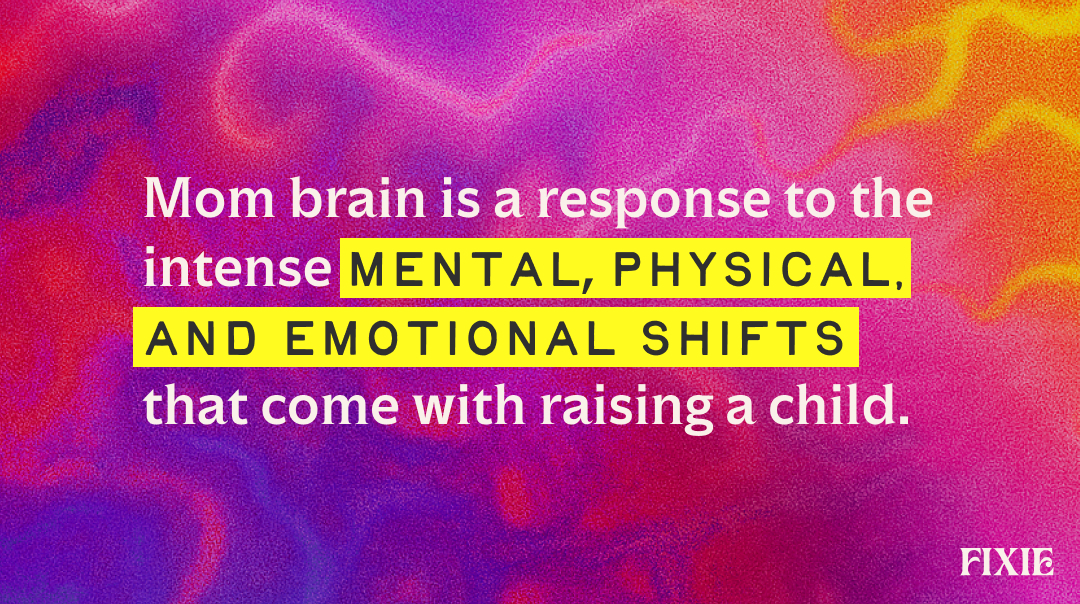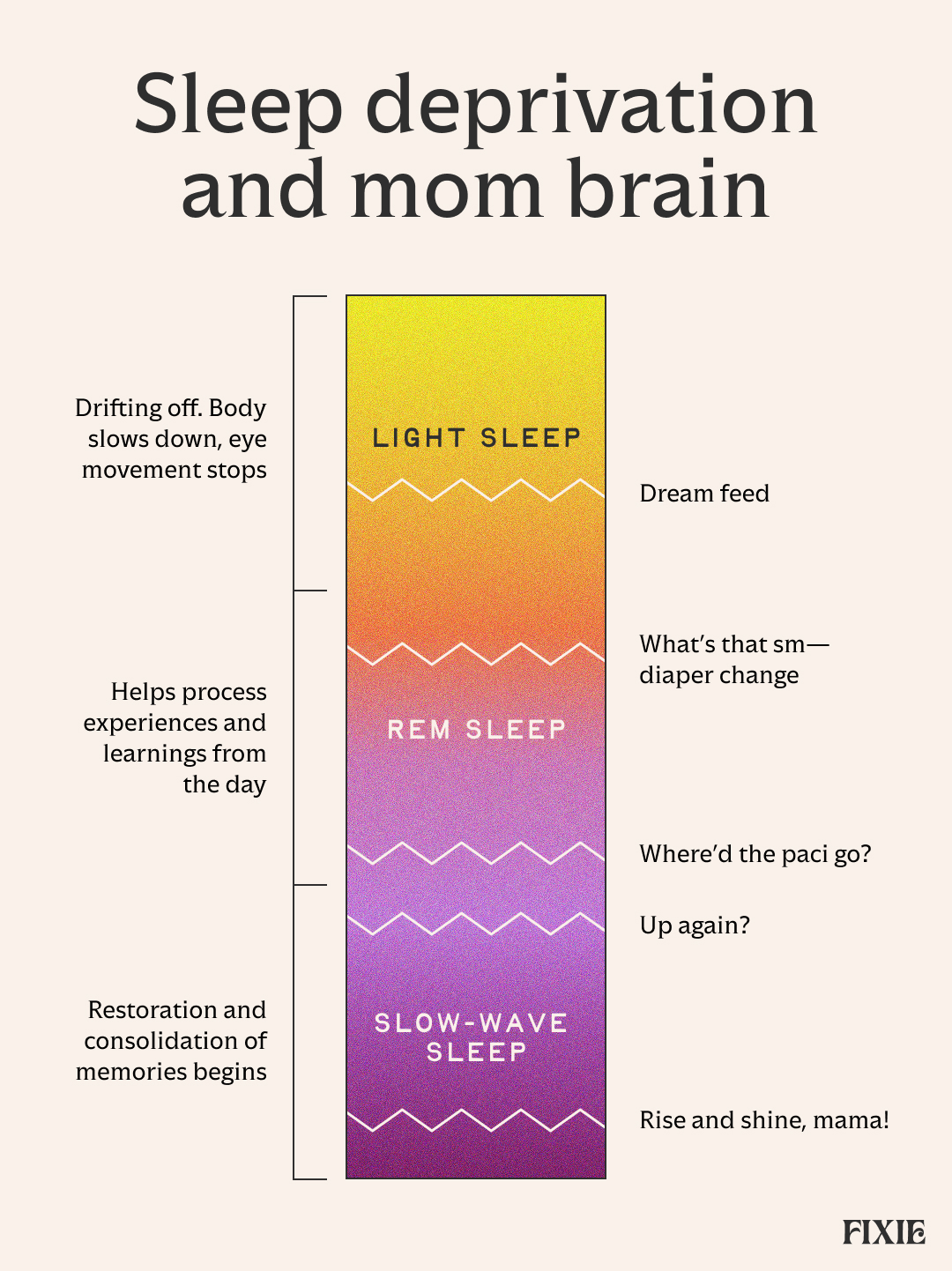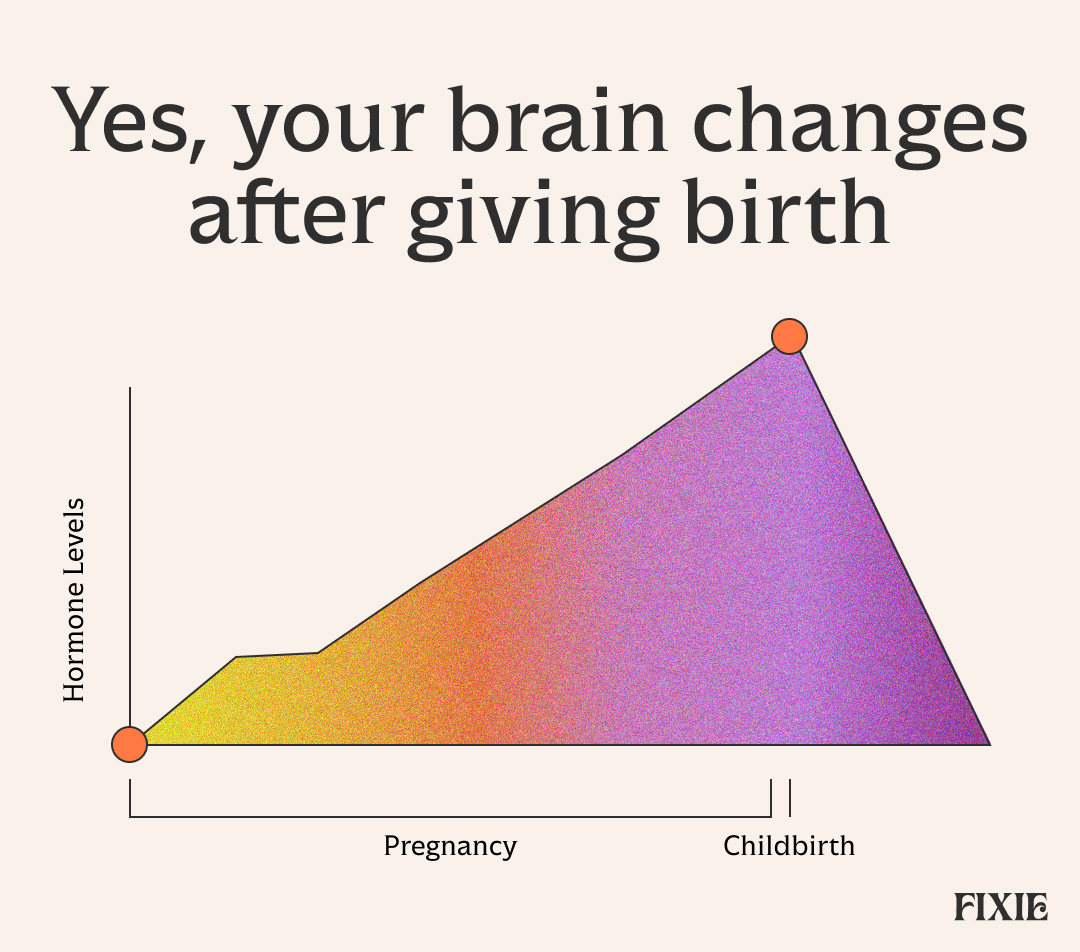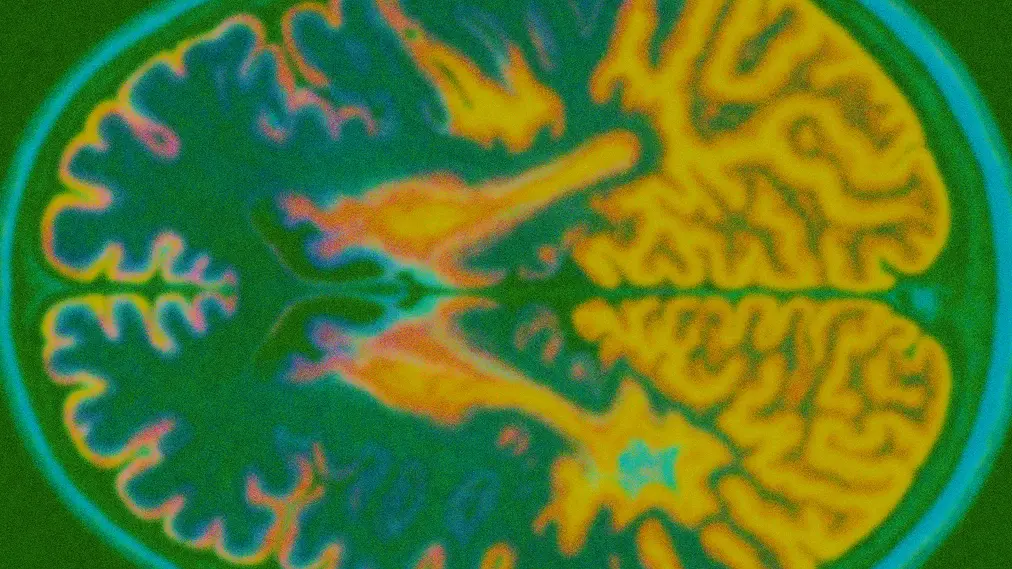Is Mom Brain Real? What Happens to Your Brain After Birth

If you're a mom, you've probably had a case of mom brain—that foggy, frazzled state where your mind is running on three hours of sleep and a half-eaten granola bar, all while keeping track of snacks, schedules, and your sanity. The good news is that mom brain isn’t just in your head. It’s totally real and backed by science. We’re diving into what’s really going on in your brain, why it feels this way, and simple (realistic!) ways to keep your mind sharp—even with little ones tornado-ing around you.
Chances are you’ve seen those hilarious videos on social media of busy, coffee-dependent moms poking fun at their “mom brain” moments. You know the kind of moments I’m talking about: forgetful, foggy, unfocused, and totally scatterbrained.
As a mom of three kiddos under six, I’m a classic case. I know all too well just how frustratingly real mom brain can be. I’ve had my fair share of half-written grocery lists sprinkled around the house, and I’ve definitely put the milk in the pantry and the cereal in the fridge more times than I’d like to admit.
But here’s the thing, mom brain isn’t all fun and memes. There’s actual science behind the hazy, overloaded feelings that so many of us experience during motherhood. If you’re fist-bumping the air in solidarity, keep reading. We’re diving into the science behind mom brain—what it is, what causes it, how it shows up, and practical ways to clear the mental fog and start feeling more like you, even with littles in tow.
Is mom brain real?
We laugh about it all the time: missing your coffee on the roof of the car, answering the door with one shoe on, or calling your kids the wrong names. But mom brain is more than a punchline or a fleeting brain blip. So, what is mom brain exactly? Let’s dive in.
“‘Mom brain’ refers to a subjective experience of brain fog, forgetfulness, and other cognitive disruptions during pregnancy and postpartum,” says Dr. Hannah Holmes, PhD, licensed psychologist. It’s real and actually rooted in real biological changes that happen during pregnancy and postpartum.
While mom brain isn’t an official medical diagnosis, animal research shows that the maternal brain physically changes during pregnancy and after giving birth. Researchers found structural changes in gray matter in the prefrontal cortex, parietal lobe, and midbrain—regions of the brain that help you process information, make decisions, and respond to your environment. In other words, when your brain changes, your behavior can too.
“Overall, gray matter volume tends to decrease during pregnancy, reaching its lowest point in late pregnancy and then partially recovering in the postpartum period,” says Holmes.
Studies show that during pregnancy, especially in the third trimester, pregnant women tend to experience decreased cognitive functioning, memory, and executive functioning compared to non-pregnant women. This is believed to be linked to a reduction in gray matter that occurs during pregnancy.

A 2024 study of one mom’s brain found that total gray matter volume and cortical thickness decreased as pregnancy progressed, with only partial recovery after birth. Remarkably, studies have also found that there’s less grey matter in mothers for six years after childbirth, suggesting long-term structural changes in the brain.
These structural changes may be driven by the roller-coaster of hormones you experience during pregnancy and postpartum. Rising levels of hormones regulate neuroplasticity (your brain’s ability to change from new experiences), neuroinflammation (inflammation in the brain), and behavior. So yes, it’s totally normal to feel mentally and emotionally changed during this season of life.
Mom brain symptoms explained
We all experience mom brain differently. For some, it’s losing their train of thought mid-sentence. For others, it’s struggling to find the right word, like the dishwasher is now the ‘plate-washing thing.’
While symptoms can vary, most moms describe it as a mix of mom brain fog, forgetfulness, and difficulty focusing. It’s that fuzzy, hazy feeling that makes you question whether you’re losing your mind or the baby’s pacifier. Again.
Brain fog
While brain fog isn’t a medical diagnosis, it’s a symptom that describes a cluster of cognitive symptoms like forgetfulness, mental fatigue, and that hazy, cloudy feeling that makes your brain feel like it’s wrapped in cotton. For moms, brain fog can look like:
- Brain burnout
- Mental exhaustion, even after adequate rest
- Struggling to make simple decisions (What’s for dinner? Don’t ask.)
- Forgetting words or misplacing things
Forgetfulness
One of the hallmark symptoms of mom brain is good old forgetfulness, those small (but incredibly maddening) memory lapses that seem to happen all. the. time. You might walk into a room and immediately forget why, or stand in the bathroom wondering if you actually brushed your teeth this morning.
In a 2021 study that evaluated cognitive and emotional function, pregnant women showed measurable impairments in memory and attention, confirming what so many moms feel on a daily basis. This isn’t a sign that something’s wrong with you—your brain is carrying a lot, and the mental load of motherhood is heavy.
Inability to focus
Another classic symptom of mom brain is lack of focus. You sit down to do something: write an email, fold the laundry, make a grocery list—and suddenly your brain goes off in five different directions.
According to JaLorean Hayes MPH, BSN, RN, IFNCP, Founder of Salt+Soil, a major culprit is lack of quality sleep. When your brain doesn’t get the time it needs to fully recharge, staying focused becomes a real challenge.
“The shift in responsibilities for the new [mother] further contributes to this by adding another layer of things to consider and a human life to protect,” she says. Call it multitasking, call it scatterbrained, call it mom brain…whatever the label, it’s really difficult to get stuff done.
Why does mom brain happen?
We know the brain physically changes during pregnancy, but what about everything that comes after? The sleepless nights, the (heavy!) mental load, the constant worrying, the stress of keeping a tiny human alive… Whether you're a first-time or seasoned mom, having a new baby turns your world upside down.
"Mom brain is likely rooted in physiology but also impacted by the demands of parenthood,” says Holmes. “One qualitative study of mothers' experiences found that mothers often believed that their moments of mom brain were caused by the daily demands of motherhood and the anxieties and social isolation that sometimes accompany new motherhood.”
In other words, mom brain is a response to the intense mental, physical, and emotional shifts that come with raising a child.
Interestingly, while many moms feel like their memory and focus have taken a hit, one study found no major differences in cognitive performance between first-time moms and women who were not mothers. Put simply, although moms may perceive changes in memory or processing speed, those differences don’t necessarily show up in studies.
Holmes explains that one possible explanation may be that the controlled, distraction-free environments of these studies look nothing like the chaotic reality of parenting. Although moms may technically perform just as well as non-moms under ideal conditions, that’s a far cry from the multitasking, sleep-deprived, emotionally taxing days most mothers navigate.
Sleep deprivation
Sleep impacts how well anyone functions, whether they’re a parent or not. “Poor quality sleep makes it harder for the brain to consolidate memories or to focus,” says Hayes. “Add this to a mom waking up several times a night to tend to the needs of an infant, there is not enough time for the brain to properly recharge.”
When we sleep, our brain cycles through different stages, each with its own important job. Missing out on any of these stages means that the brain misses out on restoration.
Hayes explains that deep sleep (also known as slow wave sleep) is when restoration and the consolidation of memories begins, and REM sleep is what helps us process our experiences and learnings from the day. If you’re waking up multiple times during the night, you’re not completing these sleep cycles, so those vital processes don’t happen.

Hormonal changes
Hormonal shifts in pregnancy and postpartum affect brain function, mood, and cognition. During pregnancy, estrogen and progesterone levels surge and then plummet after childbirth. This dramatic drop can trigger mood swings, restlessness, and brain fog.
Hayes explains that oxytocin increases during labor and childbirth, which helps with bonding and milk letdown, but it can also amplify emotions, making everything feel more intense. “Cortisol, the stress hormone, can be elevated due to increased stress and can affect memory and focus,” she says. “With all of these hormones changing in such a short period of time, it can feel overwhelming and lead to moments of brain fog and forgetfulness.”
Mental health challenges
Postpartum mental health challenges and mom brain are closely connected. “The same postpartum changes in the brain that may be adaptive for caregiving may increase risk for the development of mental disorders,” says Holmes.
“Additionally, common postpartum mental health concerns like depression, anxiety, obsessive compulsive disorder (OCD), and post-traumatic stress disorder (PTSD) can all cause cognitive symptoms such as attention difficulties, which may exacerbate [or cause] the sense of mom brain."

A change in focus and priorities
Mom brain isn’t entirely negative. Maternal mental health researchers and clinicians view it as a period of cognitive reorganization. “[It’s] a period of cognitive changes that direct energy away from typical, everyday cognitive demands and toward cognitive domains that are helpful for the unique demands of motherhood, such as attending to infant cues,” says Holmes.
In other words, these cognitive changes reflect a purposeful shift in mental resources toward the responsibilities and mental demands of motherhood. “The postpartum brain is a powerful example of neuroplasticity, where the brain undergoes adaptive changes to help a mom adapt to their challenging new role.”
And while reduced gray matter during pregnancy might sound alarming, science suggests it serves a purpose. “The same study noted that gray matter volume changes during pregnancy were [also] associated with mother-infant attachment after birth, suggesting that the reduced gray matter actually helps women transition into motherhood,” says Holmes.
According to Hayes, studies have shown that gray matter volume decreases in certain areas of the brain during pregnancy, but it’s not necessarily a bad thing. In fact, areas of the brain related to empathy and understanding others’ needs become more active and refined, helping moms better respond to their baby’s needs.
“In the early stages [of motherhood], when focusing more on the baby and dealing with sleep deprivation, cognitive resources tend to get redirected,” she says. “The brain focuses more on the needs of the infant, as that is paramount, and adapts to meeting those needs.”
This shift can make it harder to focus on anything beyond baby care, but over time, the brain recalibrates. As the demands of motherhood begin to balance out, so does your ability to manage both baby-related needs and everything else on your plate.
Does mommy brain ever go away?
The short answer: it depends. For many moms, mom brain starts to fade a few months postpartum, especially as sleep improves and life begins to feel a bit more manageable. For others, it can last much longer—sometimes two to six years after giving birth.
If you’re wondering if what you're experiencing is truly mom brain or something else, a helpful first step is to think about when the symptoms began. If they started before pregnancy, there could be an underlying cause worth exploring. But if things improve over time, it’s likely part of the normal transition into motherhood. If symptoms persist or begin to get worse, it’s always a good idea to check in with your healthcare provider.
How to fix mom brain
Let’s face it—mom brain might stick around for a bit, but that doesn’t mean you have to suffer through awkward conversations about why your kid showed up to preschool in a swimsuit (in January) or defend your bed-head at the grocery store. Here are some simple and practical ways to reclaim your focus:
- Set up phone reminders: Setting alarms on your phone, tablet, or smart home device can help you stay on top of your responsibilities. Use them to track feedings, naps, appointments, and all those little tasks that are easy to forget when your brain is juggling a million things at once.
- Maintain manageable to-do lists: I’m a big fan of lists—I’ve got them on my phone, computer, and even saved in my email drafts. Whether it’s daily, weekly, or monthly goals, they help me stay organized and on track. Plus, writing things down cuts down on overwhelm and gives you that oh-so-satisfying feeling of checking things off, even if it’s just “drink coffee while it’s still warm.” DONE.
- Take naps and breaks when you can: Even short rest breaks can work wonders for your brain. A 30-minute nap can restore clarity and your energy levels (heck, even a 7-minute power nap can make a big difference). Sleep is essential for cognitive function, so give yourself permission to rest.
- Nourish yourself: Specific nutrients can enhance cognitive function. “Omega-3 fatty acids like those from flax seeds or walnuts, antioxidants from berries and leafy greens, B vitamins, magnesium, and zinc all support a healthy brain and cognitive performance,” explains Hayes.
- Go easy on yourself: Mom brain is real, normal, and (thankfully) temporary—so go easy on yourself. Practicing self-compassion can go a long way in easing stress and helping your brain and body recover. Let go of the unrealistic expectations about what motherhood should look like. There’s no perfect version, only one that works for you and your family.
Brain-boosting nutrients
If mom brain is getting the best of you, it may be time to call in for backup. It’s always a good idea to talk to your healthcare provider before starting any supplements, but here’s a few to ask about. These nutrients and nootropics might help you bridge the mental gap:
- Omega 3 fatty acids: Support brain health and may lower risk of developing Alzheimer’s disease, dementia, and other problems with cognitive function.
- B vitamins: Crucial for energy production and brain function. Vitamin B12, specifically, supports both physical and cognitive health and helps reduce brain fog.
- Magnesium: Regulates nerve and muscle function, supports relaxation and calm, and may help reduce stress and anxiety.
- Vitamin D: May have neuroprotective effects.
- L-Theanine: Can reduce stress and promote calm.
- Citicoline: Supports the production of acetylcholine, a neurotransmitter critical for energy, attention, and memory.
- Acetyl-L-carnitine: Involved in brain cell energy production and provides neuroprotection by reducing oxidative stress.
- L-Tyrosine: This amino acid helps produce dopamine and norepinephrine, which can improve cognitive flexibility and focus.
The bottom line
Mom brain isn’t just in your head. From hormonal shifts and structural changes in the brain to sleep deprivation and the mental load of parenting, there are clear, evidence-based reasons behind your foggy and forgetful moments. The good news is—you’re not imagining it and you’re not alone. While this season can feel overwhelming, it’s only (thankfully!) temporary. With time, support, and practical strategies, your clarity will return.
Key takeaways
- Mom brain is real and supported by science. Structural changes in the brain during motherhood can lead to symptoms like forgetfulness, brain fog, and scattered thinking.
- Difficulty focusing or remembering *anything* can also stem from sleep deprivation, hormonal shifts, and the mental load of parenting.
- Mom brain isn't necessarily negative—it reflects a purposeful shift in mental resources that strengthens bonding with the baby and supports the emotional and cognitive demands of motherhood.
- These symptoms are temporary, and simple lifestyle adjustments, like using reminders, making lists, prioritizing rest, and maintaining a balanced diet can make a big difference.
Frequently Asked Questions
Every mom’s experience is unique, but many start to experience mom brain as early as pregnancy, when their brain structure begins to change. For others, symptoms don’t show up until after the baby is born, when new responsibilities pile up and sleep becomes scarce.
Attention deficit hyperactivity disorder (ADHD) is a neurodevelopmental disorder and begins in childhood. Therefore, if you have changes in your attention or memory as an adult, it’s unlikely that ADHD is the root cause.
“One of the ways you can differentiate between ADHD and “mom brain” is frequency and timing, explains Holmes. “With ADHD, symptoms occur pretty consistently (more often than not) and persistently over time.” ADHD symptoms may become more pronounced during stressful times (like after having a baby), and may resemble mom brain but in these cases, the symptoms likely existed before pregnancy, though they may have been less noticeable.
While you might not be able to “prevent” mom brain, you can absolutely give your mind what it needs to function at its best during this intense and transformative season of life.
“I don't think of mom brain as something that can be or needs to be prevented, but rather as a complex, adaptive set of changes that occur as you transition into motherhood,” says Holmes. That said, there are ways to support your cognitive health during this transition such as adequate rest, a healthy diet, and asking for help.
Some brain changes begin to normalize within weeks after birth. “Gray matter in certain areas of the brain increases within 4 to 6 weeks after delivery,” she explains. However, not all changes are short-term. In some cases, reductions in gray matter can persist for at least two years—and research suggests they may last as long as six years postpartum.
Latest Posts


%20(1).JPG)




.svg)


.jpg)
